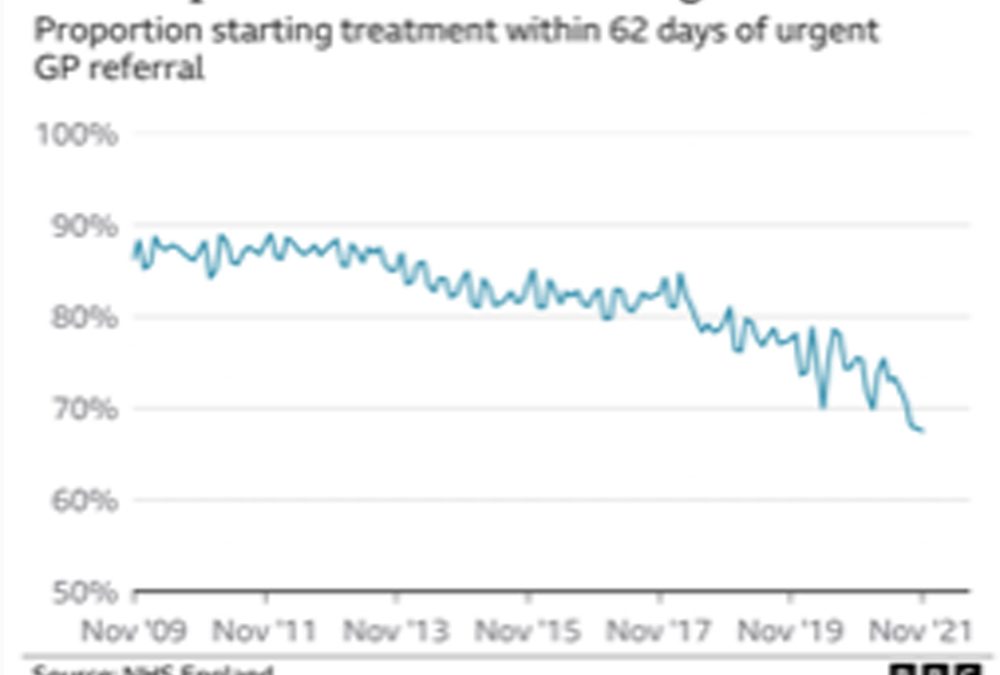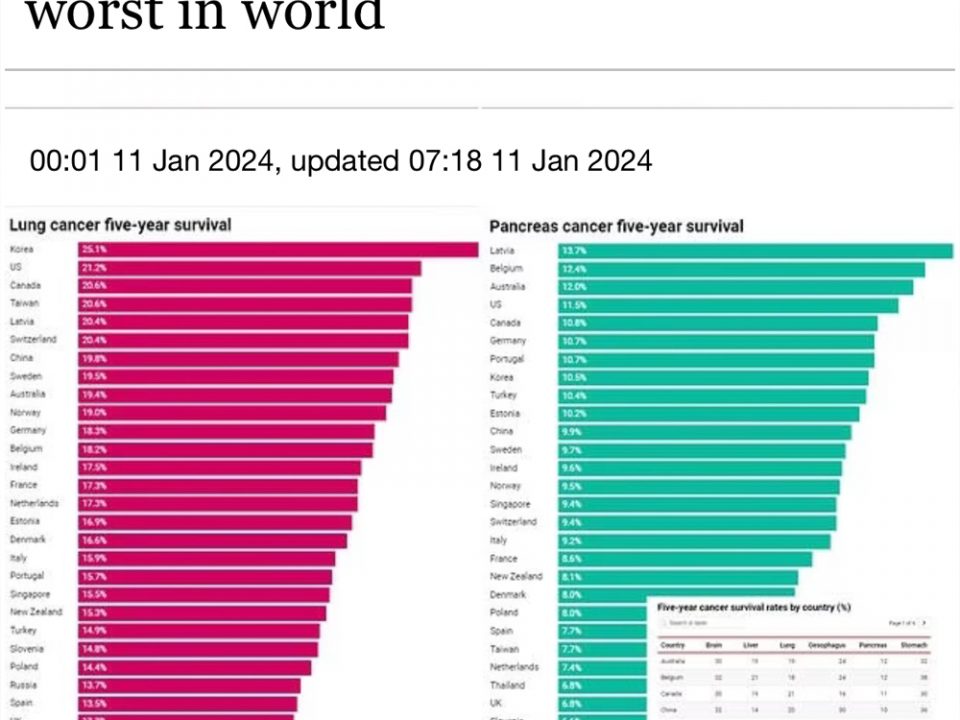
Health News – March 2022
7 March 2022
Health News – May 2022
16 May 2022Dear Surrey Circle Health Reader,
Trusting that you’re keeping fit & well – Welcome to another edition of Health News! Just where does the time go? A full quarter of the way through 2022, having actually navigated springtime, now being officially into British Summertime! Five superb articles for your attention this month from your ever vigilant healthcare reporter:-
4th March – Daily Mail newspaper, article entitled:- 85% of NHS Patients Consider Going Private
NHS waiting lists are now so long that more than eight in ten patients are considering going private, a damning poll shows. Millions are in such pain they are even prepared to plunge themselves into debt or raid their savings or pension pots to get treatment. Shockingly 93 per cent of doctors warn that patients’ outcomes have ‘worsened’ while their treatment is delayed, with 58 per cent described as ‘significantly’ – As a poll of 761 family doctors by GP magazine Pulse has revealed, leading to widespread dissatisfaction and misery. Eight in ten Britons on waiting lists now say they feel ‘failed’ by the NHS, the survey of 1,000 adults by ITV’s Good Morning Britain reveals.
It comes after the service prioritised Covid patients during the pandemic, causing huge disruption to routine care. The NHS constitution says people should get the treatment they need within 18 weeks of being referred by their GP. Waiting lists however in England stand at a record high of 6.1 million, with 310,813 patients waiting more than a year and some for more than two. Alarmingly, Health Secretary Sajid Javid has warned the list is likely to get even longer before it starts to fall. More than half of those questioned have been waiting for more than the 18-week target. Some 85 per cent have paid for or are considering private medical treatment, with 68 per cent ending up in debt as a result. Of these, 84 per cent are worried about how they will pay it off.
7thMarch – The London Standard newspaper, article entitled:- Over 20 Genetic Variants That Mean That Covid Could Cause You Serious Illness
More than 20 genetic variants that leave some people predisposed to becoming severely ill with Covid-19 have been identified by UK researchers. The world’s largest study of the genetics of the of coronavirus discovered key differences in 16 genes of patients admitted to intensive care with the virus, including those linked to blood clotting and immune response. It also confirmed the involvement of seven other genetic variations already associated with severe Covid discovered in earlier studies by the same team.
The study was led by the University of Edinburgh with Genomics England and involved the sequencing of the whole genome of 7,491 patients treated UK intensive care units. Their DNA was compared with 48,400 others who had not had Covid, participants in Genomics England’s 100,000 Genomes project and 1,630 people who had mild Covid. The study, published in Nature, found that a gene variant called interferon alpha-10 was enough to increase a patient’s risk of severe disease. This suggests that treating patients with interferon – proteins released by immune cells to defend against viruses – may help manage disease in the early stages. The study also found that variations in genes that control the levels of a component of blood clotting, known as Factor 8, were associated with critical illness. Factor 8 is the gene underlying the most common type of haemophilia.
Co-author Professor Sir Mark Caulfield, from Queen Mary University of London, said: “We’ve discovered novel gene variants that predispose people to severe illness – which now offer a route to new tests and treatments, to help protect the public and the NHS from this virus.” Separate research at Oxford University reported today found changes to the brain after even a mild Covid infection. People who had Covid suffered greater cognitive decline and there was an “average reduction in whole brain sizes.” Further investigation is required to determine whether the effects are long-lasting or can be partially reversed.
13th March – The Spectator magazine, carried an article entitled:- Britain is Facing a Cancer-Care Timebomb
As many as 100,000 patients had a cancer that was missed, or had their diagnoses or treatments delayed during the lockdowns of 2020 and 2021. That’s the shocking finding of a recent study by the Institute of Cancer Policy at King’s College London. The experts conclude that some patients will already have died, many still haven’t been diagnosed and others will already have a more advanced cancer as a result of the delays. And it is likely this figure of 100,000 will continue to rise as more data from 2021 and early 2022 is analysed. In other words, there could not be a more important time to fix cancer care in this country.
This week the government opened a consultation on its ten year cancer plan – part of its ‘national war on cancer’ – to reduce this cancer backlog. The plan aims to improve cancer care with earlier detection, a larger workforce and new technologies. But there are already worrying signs that the government is going down the wrong path – with potentially disastrous consequences. A key plank of the government’s cancer strategy is to increase the number of patients that are referred to a specialist by their GP. The aim is to catch cancers earlier – and to meet a target set by the NHS in 2019 that 75 per cent of diagnoses happen before the cancer is late stage. Improving this is a laudable and important aim, but by reducing the threshold for cancer referrals the government could just be making the situation worse.
At the moment waiting times for urgent cancer referrals are increasing rapidly. Currently only 50 per cent of people with an urgent breast cancer referral get to see a specialist within two weeks. Fifteen per cent are having to wait longer than a month. If the floodgates are opened now and the number of referrals goes through the roof, this will sink an already overwhelmed workforce and mean that those most in need of urgent care will miss out. Instead, the government should take a more targeted approach, focused on raising awareness of specific cancer symptoms. It should also remember that many cancers are found following routine rather than urgent GP cancer referrals. Other government reforms suggest that there is still too much focus on procedure instead of outcomes.
14th March – My Tribe Insurance – Independent Health Insurance Information Service, carried out a review entitled:- Best Private Health Insurance (UK)
Health insurance is becoming increasingly popular in the UK, not least due to the record backlog the NHS is currently facing. But with so many options available, it can be difficult to find the best private healthcare provider. This guide compares some of the top companies with their leading policies to help you find the best option for you. Bullet-point headlines being –
Aviva – Healthier Solutions policy; New customers benefit from a “Renewal Price Guarantee.” Limited mental health in base product. Only pay for the first child. Cover for some chronic monitoring consultation.
AXA Health – Personal Health policy; Flexible policy with generous “Standard” outpatient limits. No limits on therapies cover and high customer satisfaction ratings. Offering NCD protection. Fast-Track consultation with second opinion option built in.
Bupa – Comprehensive policy; No age restriction for new customers, being an industry rarity. See a cancer specialist without seeing your GP first. Mental health cover is included in the core product. The only UK provider with their own medically qualified professionals in-house. Good customer reviews.
Exeter (The) – Health+ policy; Very good for policy comprehensiveness and customer service. Community rated option so individual claims don’t affect renewal premiums, even for 70-80 year olds, being the only insurer to offer such.
Freedom – Elite policy; Community rated scheme with two year renewal premium guarantee. Unrestricted consultant choice with extensive hospital listing. Pricing not based upon post-code, being rare in the industry.
National Friendly – Optimum policy; Claims won’t affect renewal premiums until your fifth year. Excellent hospital list. Reduce your excess to zero with very little change in your premium. Affordable £5,000 outpatient limit. Overall one million pounds limit. Excellent customer reviews.
VitalityHealth – Personal policy; Extensive industry innovating rewards scheme that promotes healthy living among members. Renewal premiums linked to your health, saving up to 25%. Discount currently of 15% for those without any recent health issues of any significance, being unique in the industry.
23rd March – Daily Mail newspaper, with article entitled:- Lonelier, Sleeping Badly, Addicted to Screens… Legacy of Virus Two Years On
The toll of the pandemic on the nation’s wellbeing has been laid bare. Not only are we lonelier, Covid has also hurt our sleep and made us more addicted to screens, research reveals. Exactly two years after the first national lockdown began, many of us are still suffering from pandemic pessimism. More than half of respondents to an Ipsos survey earlier this month said they fear the pandemic is not yet over, while nearly one in ten believe things will never return to the way they were. In a sign that we are not through with Covid yet, half of those surveyed said they would support the reintroduction of restrictions if a dangerous variant emerged.
Of the 1,229 adults surveyed, a third said their physical and mental health had declined – with women particularly affected – and the same proportion had put on weight. Three in ten said they feel lonelier now than before the pandemic, with young people suffering the most, and almost half of adults see friends and family less and stay at home more often than they used to. Half said they spend more time looking at screens, with two-fifths still checking media daily for Covid updates. One in three also said that their quality of sleep had worsened, getting in fewer hours and feeling more disturbed at night.
There you have it for another month reader! Please be mindful of the current spike, being hopefully Omicron’s ‘last-gasp hurrah’ as we venture out into the spring sunshine, and although no longer required by law, I for one still have my multitude of masks to hand stuffed into coat & trouser pockets! Until May enjoy the ‘business-end’ of the football season and above all else please stay safe & well.
Kindest regards,
Daniel Donoghue,
Brokerage Director
Surrey Circle Health





